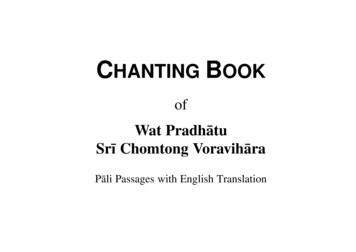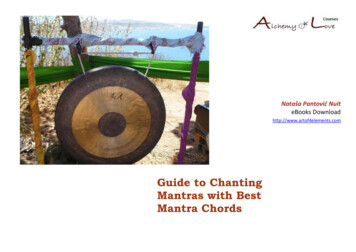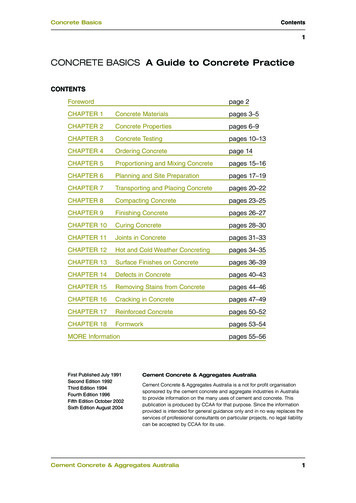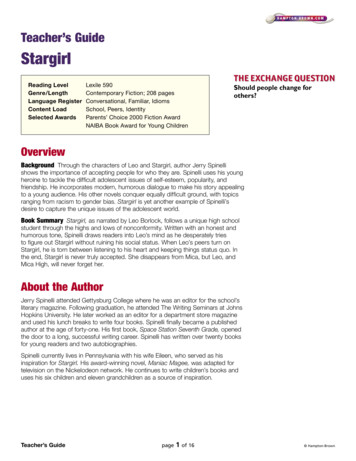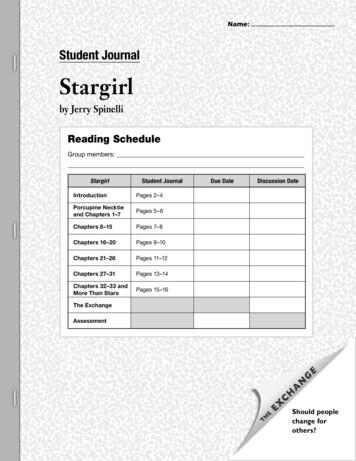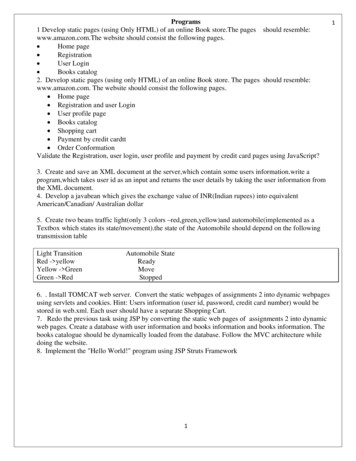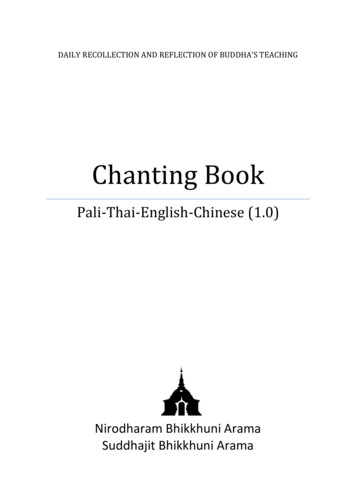
Transcription
DAILY RECOLLECTION AND REFLECTION OF BUDDHA’S TEACHINGChanting BookPali-Thai-English-Chinese (1.0)Nirodharam Bhikkhuni AramaSuddhajit Bhikkhuni Arama
Compiler: Suddhajit Bhikkhuni Arama (Niro จิตต์Contact address: 88/1 Moo 9, Tambol Luang Nua,Amphur Doi Saked, Chiangmai, Thailand, 50220.88/1 หมู่ 9 ต.ลวงเหนือ อ.ดอยสะเก็ด จ.เชียงใหม่ 50220.Tel: (66)081-903-4393, (66)081-205-5416.nirotharam@gmail.comVersion: Chanting Book (1), Version 1.Year: 2014.First printing: 1000 copies.For free distribution免费赠阅
DAILY RECOLLECTION AND REFLECTION OF BUDDHA’S TEACHINGChanting BookPali-Thai-English-Chinese (1.0)Nirodharam Bhikkhuni AramaSuddhajit Bhikkhuni Arama
NIBBĀNA 涅槃§Buddha:For one who clings, motion exists; but for one who clingsnot, there is no motion. Where no motion is, there isstillness. Where stillness is, there is no craving. Where nocraving is, there is neither coming nor going. Where nocoming nor going is, there is neither arising nor passingaway. Where neither arising nor passing away is, there isneither this world nor a world beyond, nor a state between.This, indeed, is the end of �之尽。Catutthanibbānapaṭisaṃyutta Suttaṃ (UD 8.4)§English translation by Nyanaponika, in ‘Four Sublime States’ BPS Wheel Publication No. 6(1998); Chinese translation by 菩提僧團 /da/kn/ud/ud8 6
A Word on the Chanting BookThis book of chanting in multiple languages (Pali, Thai, English and Chinese) is awork of compilation in progress. It serves to guide the user through thechanting at Nirodharam Bhikkhuni Arama and Suddhajit Bhikkhuni Arama(Nirodharam 2). For the present, the book covers the chanting of the Morningand Evening sessions, one for special occasion, and principal discourses. Asecond book will be compiled to include materials on other major discourses,reflections, anumodana, formal requests and others.In the preparation and compilation of materials for this book, various existingtranslations of Theravada chanting books in various languages (Pali, Englishand Chinese) were consulted. We are grateful to those who made availabletheir translations. These made our work on compiling this book of chanting inmultiple languages (Pali, English and Chinese) easier.Many, including the bhikkhunis and sikkhamanas in our monasteries, havecontributed to the compilation of this chanting book. We are thankful to MrOliver Hargreave, Ms Sarah McClean and Mr Denis Gray who very kindly proofread and made suggestions for improvement. We are responsible forwhatever remaining errors that are found in the book and any unintentionalomissions.We may have missed citing and crediting the source of some materials, pleaseaccept our apologies and inform us (nirotharam@gmail.com). Similarly if youdetect any errors or have any suggestions for improvement, please inform usso that they can be corrected and improvements made in future editions. Theprinting of this book is made possible by donations from many friends inDhamma and their contribution is and will be much appreciated, particularly bythe users (see list of donors at the end of this book).The Teachings of the Buddha answer our questions on life, however many anddiverse may these questions be, and lead and guide us straightforwardly on theRIGHT PATH to the RIGHT DESTINATION – the ultimate answer to the ultimatequestion everyone asks on life.May your daily practice of the morning and evening chanting set you right forthe day and ease you through the night.May insight arise in you as you chant, recall, reflect and contemplate on thevirtues and qualities of the Triple Gem, and the Teachings of the Buddha.i
Table of YA VANDANĀ [Kham Bucha Phra RattanaTrai] Salutation to the Triple Gem 礼敬三宝2B1PUBBABHĀKANAMAKĀRAPĀṬHA The PreliminaryPassage for Revering 礼赞佛陀世尊3B1BUDDHĀBHITHUTI Praise for the Buddha 赞颂佛陀4B2DHAMMĀBHITHUTI Praise to the Dhamma 赞颂法7B3SAṄGHABHITHUTI Praise for the Saṅgha 赞颂僧伽RATANATTAYAPPAṆĀMA GĀTHĀSalutation to the Triple Gem ression of Spiritual Urgency ��APĀṬHATen Subjects for Frequent Reflection 十种省思经21W6TĀYANA GĀTHĀ The Verse to �APĀṬHA Reflection at theMoment of Using the Requisites CCAVEKKHAṆAPĀṬHA Reflection onElements and Loathesomeness I. MORNING CHANTING 早课 THAM WAT CHAO ANDEVENING CHANTING 晚课 THAM WAT YENHomage and Offerings to the Triple Gem [Kham ThawaiKhrueang Sakkara Bucha Phra Rattana Trai] 供奉三宝II. MORNING CHANTING (早课) THAM WAT CHAO iiClosing HomagePaying Respect and Expressing Gratitude to Parents andTeachersiThai chanting book of brown cover (page number preceded by B) or white cover (pagenumber preceded by W).iiSelections of suttas other than those shown above in each of the chanting and practicesessions are in a separate compilation to follow later.iiiBack cover of Thai chanting book (brown).ii
Page(ThaiBooks)BCRATANATTAYA VANDANĀKham Krap Phra Salutation to the Triple Gem 礼敬三宝2B1PUBBABHĀKANAMAKĀRAPĀṬHAThe Preliminary Passage for Revering 礼赞佛陀世尊3B1BUDDHĀNUSSATI Recollection on the Buddha 佛随念38B8BUDDHĀBHIGĪTIVerses in Celebration of the Buddha 歌颂佛陀40B8DHAMMĀNUSSATI Recollection of the Dhamma 法随念44B10DHAMMĀBHIGĪTIVerses in Celebration of the Dhamma 歌颂法45B10SAṄGHĀNUSSATI Recollection of the Saṅgha 僧随念48B11SAṄGHĀBHIGĪTIVerses in Celebration of the Saṅgha 歌颂僧50B12ATĪTAPACCAVEKKHAṆAPĀṬHA Reflection after Using theRequisites AN THA NOI Asking for Forgiveness from the NIRODHASAÑÑĀ [Jam Khwam Suk Yang Ying] Perceptionof Nirodha (Cessation)观修灭想62B84(DEVATĀ-) PATTIDĀNA-GĀTHĀ Offering Merit To TheDevas 回向功德65B13APPAMĀṆĀ CETOVIMUTTI The Boundless liberations of68B60ContentsOKASA VANDAMI ACARIYA/AYYEIII. EVENING CHANTING (晚课) THAM WAT YENivClosing HomagePaying Respect and Expressing Gratitude to Parents andTeachersIV. REGULAR DAILY SELECTIONSCATTĀRI ADHIṬṬHĀNĀNI - Athitthanadhamsi FourResolves for Attainment of Liberation 四種依處iviPage(thisbook)37See footnote ii above.iii
79B6381B64AṬṬHASIKKHĀ SAMĀDĀNA (Samathan Sin Paet) ThreeRefuges and Eight Precepts 求授三皈八戒86B64DASASIKKHĀ SAMĀDĀNA (Samathan Sin Sip) ThreeRefuges and Ten Precepts 求授三皈十戒90UPOSATHASĪLA Taking the Three Refuges and UposathaPrecepts 求授三皈八关斋戒93UPASAMPADA Ordination Procedure for an EightPrecept Nun 求授三皈白衣女八戒96REQUEST FOR GIVING UP THE PRECEPTS 舍戒文98B65ASK FOR FORGIVENESS FROM TRIPLE GEMASKING FOR FORGIVENESS FROM SANGHA BEFORETAKING LEAVEAFTER A DHAMMA TALKVI. CHANTING ON SPECIAL OCCASIONS (PARITTAPROTECTION CHANTING 护卫经念诵)v99B64Contentsthe Mind 無量心解脫JAROEN METTĀ BRAHMAVIHĀRA (phae-met-ta) andPHAWANA Radiating Loving-Kindness& Meditation梵住遍满KATHA ATHITTHAN SUAN BUN (PAṬIḌANAPANA GĀTHĀ)KHAM KRUAT NAM BAEP PHUEN MUEANG OfferingMerit (Northern Thai Style) 回向功德(北泰)WAN THA LUANG Asking For Forgiveness from the TripleGem And All DevasWAN THA NOI Asking for Forgiveness from the Abbot分享功德与互相原谅V. FORMAL REQUESTS AND VERSESPAÑCASIKKHĀ SAMĀDĀNA (Samathan Sin Ha) Requestfor the Three Refuges and Five Precepts sting Blessings 请护卫偈v99100101See footnote ii above.ivW19
iPage(thisbook)Page(ThaiBooks)ĀRĀDHANĀ DHAMMADESANĀRequesting a Discourse 请法偈102W18DEVATĀ-ĀYĀCANA-GĀTHĀ “Chum-num-thevada”An Invitation to the Devas 邀天衆聞法103B13TISARAṆAGAMANA PĀTHA Three Refugse ĀTHĀThe Homage Octet 八南无偈109W22MAHĀ-MAṄGALA SUTTA [Mong Khon La Sut]Great Discourse on Blessings 大吉祥经111B15RATANA SUTTA Discourse On The Jewels 三寶經116W25KARAṆĪYA METTĀ SUTTAThe Discourse on Loving-kindness 慈经127B19KHANDHA PARITTA The Group Protection 蕴护卫偈132B20CHADDANTA PARITTAThe Ivory Protection 六牙象王护卫经135W30MORA PARITTA The Peacock’s Protection 孔雀護衛偈136W30DHAJAGGA PARITTA The Banner Protection 旌旗顶经138W34VAṬṬAKA PARITTAThe Baby Quail's Protection 鹌鹑护卫偈139W31ĀṬĀNĀṬIYA PARITTATwenty-Eight Buddhas’ Protection 阿达那地雅护卫偈141W32AṄGULIMĀLA PARITTAVenerable Angulimala's Protection 指鬘经151W38BOJJHAṄGA PARITTĀSeven Factors of Enlightenment �GALA GĀTHĀ The Verses of theBuddha's Auspicious Victories 佛胜吉祥偈155B73ContentsNAMAKKĀRAṂ Homage – Recalling Attributes of TripleGemNAMAKĀRA-SIDDHI GĀTHĀ The Verses on SuccessThrough Homage 礼敬胜利偈v
Page(thisbook)JAYA PARITTA The Victory Protection 胜利偈159Page(ThaiBooks)B75ABHAYA PARITTAThe Danger-free Protection 无畏护卫偈161B24DEVATĀ UYYOJANA GĀTHĀ Sending Devas Back 苦缠偈163B24165B26ANATTA-LAKKHAṆA SUTTAThe Characteristics of Non-self 无我相经177W69ĀDITTAPARIYĀYA SUTTA The Fire Discourse 燃烧经187W76PURĀBHEDA SUTTABefore the Body’s Destruction 毁灭以前经195W135ĀNĀPĀNASSATI SUTTAMindfulness of Breathing 入出息念經200B35PAṬICCASAMUPPĀDA Dependent Origination 缘起205W84ContentsVII. DISCOURSES viDHAMMACAKKAPPAVATTANA SUTTASetting the Wheel of Dhamma in Motion 转法轮经VII. REFERENCES AND ONLINE RESOURCESVIII. ANUMODANA – Rejoicing with DonorsviiSee footnote ii above.vi207208
1I. MORNING CHANTING 早课 THAM WATCHAO and EVENING CHANTING 晚课THAM WAT YENHomage and Offerings to the Triple GemKham Thawai Khrueang Sakkara BuchaPhra Rattana Trai 供奉三宝Chant as we offer flowers, incense and candles to the Triple Gem:IMINA SAKKĀRENA BUDDHAṂ ABHIPŪJAYĀMA.Khaphajao thang lai, kho bucha yang ying, sueng PhraPhutthajao, duai khrueang sakkara thang lai lao niWith these offerings we worship most highly that Blessed OneIMINA SAKKĀRENA DHAMMAṂ ABHIPŪJAYĀMA.Khaphajao thang lai, kho bucha yang ying, sueng Phra Tham,duai khrueang sakkara thang lai lao niWith these offerings we worship most highly the True DhammaIMINA SAKKĀRENA SAṄGHAṂ ABHIPŪJAYĀMAKhaphajao thang lai, kho bucha yang ying, suengMukhanasawok khong Phra Phutthajao, duai khrueang sakkarathang lai lao niWith these offerings we worship most highly the Sangha of hisdisciples.Note: Whenever there is prostration to the Triple Gem, performeach prostration and say:Krap ra luek thueng khun an prasoet khong Phra Phutthajao(prostration to Buddha) /Phra Tham (prostration to the Dhamma)/Mukhana sawok khong Phra Phutthajao (prostration to Sangha).
2RATANATTAYA VANDANĀKham Bucha Phra Rattana TraiSalutation to the Triple Gem 礼敬三宝ARAHAṂ SAMMĀSAMBUDDHO BHAGAVĀ;Phra phu mi Phra Phakjao pen phra arahan dap phloeng kilesphloeng thuk sin choeng tratsaru chop dai doi phra ong engThe Exalted One, far from defilements, Perfectly Enlightened byHimself; 世尊是阿罗汉,正自觉者。BUDDHAṂ BHAGAVANTAṂ ABHIVĀDEMI. (Five pointprostration once 一拜)Khaphajao aphiwat phra phu mi Phra Phakjao phu ru phu tuenphu boek banI pay homage to the Awakened One, the Blessed One. 我礼敬佛陀,世尊.SVĀKKHĀTO BHAGAVATĀ DHAMMO.Phra Tham pen Tham thi phra phu mi Phra Phakjao trat wai dilaewThe Dhamma is well-expounded by the Blessed One法乃世尊所善说.DHAMMAṂ NAMASSĀMI.(Five point prostration once 一拜)Khaphajao namassakan phra ThamI pay homage to the Dhamma. 我礼敬法.SUPAṬIPANNO BHAGAVATO SĀVAKA SAṄGHO.Mukhanasawok khong phra phu mi Phra Phakjao patibat dilaewThe Sangha of the Blessed One's disciples has practiced AṂ NAMĀMI. (Five point prostration once 一拜)Khaphajao nopnom Mukhanasawok (Phra Song) mu nanI pay respect to the Sangha.我礼敬僧.
3PUBBABHĀKANAMAKĀRAPĀṬHAThe Preliminary Passage for Revering 礼赞佛陀世尊LEADER 领诵者:[HANDA MAYAṂ BUDDHASSA BHAGAVATO PUBBABHĀGA-NAMAKĀRAṂ KAROMA SE:]Now let us chant the preliminary passage in homage to theAwakened One, the Blessed �敬吧ALL 全体:NAMO TASSA BHAGAVATO ARAHATO SAMMĀSAMBUDDHASSA.(Three times)Kho nopnom dae phra phu mi Phra Phakjao phra ong nansueng pen phu klai jak kiles tratsaru chop dai doi phra ong engHomage to the Exalted One, the Emancipated (Worthy) One, the onefree from defilements, the Perfectly Self-awakened 三称]Dhammapada Verse 6 Kosambaka Vatthu 法句经双品Pare ca na vijānanti, mayamettha yamāmase;Ye ca tattha vijānanti, tato sammanti medhagā.Verse 6: There are those who do not realize that one day we allmust die. But those who do realize this settle their quarrels.6. �知此,则诤論自息。Note: All Dhammapada verses in this book are quoted from ‘TheDhammapada – The Buddha’s Path of Wisdom’ (E-book edition, 2012)by Buddharakkhita, and Chinese translation of the same book by Yehchün(葉均).
4II. MORNING CHANTING 早课THAM WAT CHAOBUDDHĀBHITHUTIPraise for the Buddha 赞颂佛陀LEADER 领诵者:[HANDA MAYAṂ BUDDHĀBHITHUTIṂ KAROMA SE:]Now let us give high praise to the Awakened One:现在,让我们赞颂佛陀吧.ALL 全体:[YO SO TATHĀGATO]Phra tathakhot jao nan phra ong daiThe Tathagata is the Noble One, He who has attained the Truth那位如来ARAHAṂPen phu klai jak kilesThe Worthy One, free from defilements 是阿罗汉SAMMĀSAMBUDDHOPen phu tratsaru chop dai doi phra ong engPerfectly Self-awakened 正自觉者VIJJĀCARAṆA SAMPANNOPen phu thueng phrom duai vitcha lae jarana (khue khwam rujaeng lae khwam pra phuet thi di ngam)Perfect in knowledge and conduct 明行具足
5SUGATOPen phu pai laew duai diOne who has gone the good way 善至LOKAVIDŪ,Pen phu ru lok yang jam jaengKnower of the worlds 世间解ANUTTARO PURISA DHAMMASĀRATHIPen phu samat fuek bukkhon thi somkhuan fuek dai yang maimi khrai ying kwaUnexcelled trainer of those who can be taught 无上者, 调御丈夫SATTHĀ DEVA MANUSSĀNAṂPen khru phu son khong thevada lae manut thanglaiTeacher of devas and humans 天人导师BUDDHOPen phu ru phu tuen phu boek ban duai ThamThe Awakened One 佛陀BHAGAVĀPen phu mi khwam jamroen jamnaek Tham sangson satThe Blessed one. 世尊.YO IMAṂ LOKAṂ SADEVAKAṂ SAMĀRAKAṂSABRAHMAKAṂ, SASSAMAṆA-BRĀHMAṆIṂ PAJAṂSADEVA-MANUSSAṂ SAYAṂ ABHIÑÑĀ SACCHIKATVĀPAVEDESI.Phra phu mi Phra Phakjao phra ong dai, dai song tham khwamdap thuk hai jaeng duai phra panya an ying eng laew, song sonlok ni phrom thang thevada man phrom lae mu sat, phromthang samana phram, phrom thang thevada lae manut hai rutamHaving realized with his own direct knowledge this world with itsdevas, Mara, and Brahma, this population with its ascetics andbrahmins, with its devas and humans, he makes it known to 悟后宣说
6YO DHAMMAṂ DESESIPhra phu mi Phra Phakjao phra ong dai song sadaeng ThamlaewHe teaches (points out) the Dhamma 他所教导之法是ĀDI-KALYĀṆAṂDi ngam nai bueang tonBeautiful (fine) in the beginning 初善MAJJHE-KALYĀṆAṂDi ngam nai tham klangBeautiful (fine) in the middle 中善PARIYOSĀNAKALYĀṆAṂ.Di ngam nai thi sutBeautiful (fine) in the end 后善的SĀTTHAṂ SABYAÑJANAṂ KEVALA-PARIPUṆṆAṂPARISUDDHAṂ BRAHMACARIYAṂ PAKĀSESI.Song prakat phrommajan khue baep haeng kan patibat anprasoet borisut boribun sin choeng phrom thang attha (khwammai lae prayot) phrom thang phayanchana (hua kho)With the right meaning and expression (complete in details, inessence and particulars), he reveals a holy life that is perfectlycomplete and purified. 说明有义有文, 完全圆满清净的梵行.TAMAHAṂ BHAGAVANTAṂ ABHIPŪJAYĀMI,Khaphajao bucha yang ying chapho phra phu mi Phra Phakjaophra ong nanI worship most highly that Blessed One 让我敬奉彼世尊.TAMAHAṂ BHAGAVANTAṂ SIRASĀ NAMĀMI.(five point prostration once 一拜)Khaphajao nopnom phra phu mi Phra Phakjao phra ong nanduai sian klaoTo that Blessed One I bow my head down. 让我头面礼敬彼世尊.
7DHAMMĀBHITHUTIPraise to the Dhamma 赞颂法LEADER 领诵者:[HANDA MAYAṂ DHAMMĀBHITHUTIṂ KAROMA SE:]Now let us give high praise to the Dhamma:现在,让我们赞颂法吧.ALL 全体:[YO SO SVĀKKHĀTO] BHAGAVATĀ DHAMMOPhra Tham nan dai pen sing thi phra phu mi Phra Phakjao daitrat wai di laewThe Dhamma well-proclaimed by the Blessed �HIKOPen sing thi phu sueksa lae patibat phueng hen dai duai ton eng(Its knowledge and practice) to be seen for oneself (here and IKOPen sing thi patibat dai lae hai phon dai mai jamkat kanTimeless (its fruition unlimited by time) 超越时间与空间(无时的)EHIPASSIKOPen sing thi khuan klao ka phu uen wa than jong ma du thoetInviting all to come and see 请来亲自查看OPANAYIKOPen sing thi khuan nom khao ma sai tuaLeading inward (into the mind) 向内返照PACCATTAṂ VEDITABBO VIÑÑŪHIPen sing thi phu ru ko ru dai cha-pho tonTo be seen by the wise for themselves. 智者皆能各自证知.
8TAMAHAṂ DHAMMAṂ ABHIPŪJAYĀMIKhaphajao bucha yang ying cha-pho Phra Tham nanI worship most highly that Dhamma. 让我敬奉彼法.TAMAHAṂ DHAMMAṂ SIRASĀ NAMĀMI (five pointprostration once 一拜)Khaphajao nopnom Phra Tham nan duai sian klaoTo that Dhamma I bow my head se for the Saṅgha 赞颂僧伽LEADER 领诵者:[HANDA MAYAṂSAṄGHABHITHUTIṂ KAROMA SE:]Now let us give high praise to the Saṅgha 现在,让我们赞颂僧吧ALL 全体:[YO SO SUPAṬIPANNO] BHAGAVATO SĀVAKA-SAṄGHOMukhanasawok (Phra Song) khong phra phu mi Phra Phakjaonan mu dai patibat di laewThe Saṅgha of the Blessed One's disciples who have practiced 地修行佛法)UJU-PAṬIPANNO BHAGAVATO SĀVAKA-SAṄGHOMukhanasawok (Phra Song) khong phra phu mi Phra Phakjaomu dai patibat tong laewThe Saṅgha of the Blessed One's disciples who have 正直行道者 (直接地修行佛法).ÑĀYA-PAṬIPANNO BHAGAVATO SĀVAKA-SAṄGHOMukhanasawok (Phra Song) khong phra phu mi Phra Phakjaomu dai patibat phuea ru Tham pen khrueang ok jak thuk laew
9The Saṅgha of the Blessed One's disciples who have practicedmethodically 世尊的弟子僧团是如理行道者 (正确地修持佛法以求脱离苦)SĀMĪCI PAṬIPANNO BHAGAVATO SĀVAKA SAṄGHOMukhanasawok (Phra Song) khong phra phu mi Phra Phakjaomu dai patibat somkhuan laewThe Saṅgha of the Blessed One's disciples who have practicedmasterfully 世尊的弟子僧团是正当行道者 ��Dai kae bukkhon lao ni khueThat is (the individuals are) 他们即是CATTĀRI PURISAYUGĀNI AṬṬHA PURISA PUGGALĀKhu haeng klum bukkhon si khu nap riang klum bukkhon daipaet klumThe four pairs —the eight types — of Noble Ones 四双八辈行者(四双八士),ESA BHAGAVATO SĀVAKA SAṄGHO —Nan lae Mukhanasawok (Phra Song) khong phra phu mi PhraPhakjaoThat is the Saṅgha of the Blessed One's disciples —此乃世尊的弟子僧团 ĀHUNEYYOPen phu khuan kae sakkara thi khao nam ma buchaWorthy of gifts 应受供养 (虔诚礼敬)PĀHUNEYYOPen phu khuan kae sakkara thi khao jat wai tonrapWorthy of hospitality 应受供奉DAKKHIṆEYYOPen phu khuan rap thaksinathanWorthy of offerings 应受布施(布施供养)
10AÑJALĪ KARAṆĪYOPen phu thi bukkhon thua pai khuan tham anchaliWorthy of respect 应受合掌(合什敬礼)ANUTTARAṂ PUÑÑAKKHETTAṂ LOKASSAPen nuea na bun khong lok mai mi na bun uen ying kwaThe incomparable field of merit for the world (one who givesoccasion for incomparable goodness to arise in the world)是世间的无上福田。TAMAHAṂ SAṄGHAṂ ABHIPŪJAYĀMIKhaphajao bucha yang ying chapho Mukhanasawok (PhraSong) mu nanI worship most highly that Saṅgha. 让我敬奉彼僧.TAMAHAṂ SAṄGHAṂ SIRASĀ NAMĀMI(five point prostration)Khaphajao nopnom Mukhanasawok (Phra Song) mu nan duaisian klaoTo that Saṅgha I bow my head down.让我头面礼敬彼僧.Dhammapada Verse 68 Sumanamalakara Vatthu 法句经愚品Tañca kammaṃ kataṃ sādhu, yaṃ katvā nānutappati;Yassa patīto sumano, vipākaṃ paṭisevati.Verse 68: Well done is that action of doing which one repents notlater, and the fruit of which one reaps with delight and happiness.68. �,应得受異熟.
11RATANATTAYAPPAṆĀMA GĀTHĀSalutation to the Triple Gem 禮敬三寶与增益警惕心偈LEADER 领诵者:[HANDA MAYAṂ RATANATTAYAPPAṆĀMA-GĀTHĀYOCEVA SAṂVEGA-PARIKITTANAPĀṬHAÑCABHAṆĀMA SE:]Now let us recite the verses in salutation to the Triple Gem and thepassage to arouse urgency (on the topics inspiring a sense ofchastened ��说明增益警惕心的诵文吧.ALL 全体:[BUDDHO SUSUDDHO] KARUṆĀ-MAHAṆṆAVOPhra Phutthajao phu borisut mi phra karuna dut huangmahannopThe Buddha, well-purified, with ocean-like TA-SUDDHABBARA-ÑĀṆA-LOCANOPhra ong dai mi ta khue yan an prasoet mot jot thueng thi sutPossessed of the eye of knowledge completely purified (pristineinsight wisdom) 擁有具足清淨的智慧眼LOKASSA PĀPŪPAKILESA-GHĀTAKO:Pen phu kha sia sueng bap lae upakiles khong lokDestroyer of the evils and corruptions of the world 者VANDĀMI BUDDHAṂ AHAMĀDARENA TAṂKhaphajao wai Phra Phutthajao phra ong nan doi jai khaoropuea-fueaI revere that Buddha with devotion.我虔誠地禮敬彼佛陀.DHAMMO PADĪPO VIYA TASSA SATTHUNOPhra Tham khong phra sassada sawang rung rueang priap
12duang prathipThe Teacher's Dhamma, like a lamp 世尊之法,如一盞明燈YO MAGGA-PĀKĀMATA-BHEDABHINNAKOJamnaek praphet khue mak phon nipphan suan daiDivided into Path, Fruition, and Deathless (which illuminates thePath, the Fruition and the Deathless) 分爲道,果,涅槃,LOKUTTARO YO CA TA-DATTHA-DĪPANO:Sueng pen tua lokuttara lae suan dai thi chi naew haenglokuttara nanBoth transcendent (itself) and showing the way to that goal既自超世,又指明超世之道VANDĀMI DHAMMAṂ AHAMĀDARENA TAṂKhaphajao wai Phra Tham nan doi jai khaorop uea-fueaI revere that Dhamma with devotion. 我虔誠地禮敬彼法.SAṄGHO SUKHETTĀBHYATIKHETTA-SAÑÑITOMukhanasawok (Phra Song) pen na bun an ying yai kwa na bunan di thang laiThe Saṅgha, called a field better than the best (most fertile groundfor cultivation) 僧伽被稱爲無上福田YO DIṬṬHA-SANTO SUGATĀNUBODHAKOPen phu hen phra nipphan tratsaru tam phra sukhot mu daiWho have seen peace, awakening after the one gone the good way他們追隨善逝者證得甯靜, 覺醒LOLAPPAHĪNO ARIYO SUMEDHASO:Pen phu la kiles khrueang lo-le pen Phra Ariyajao mi panya diWho have abandoned carelessness — the noble ones, the wise (nobleand wise, all clinging ANDĀMI SAṄGHAṂ AHAMĀDARENA TAṂKhaphajao wai Mukhanasawok (Phra Song) mu nan doi jaikhaorop uea-fueaI revere that Saṅgha with devotion. 我虔誠地禮敬彼僧伽.
13ICCEVAMEKANTABHIPŪJANEYYAKAṂ VATTHUTTAYAṂVANDAYA TĀBHISAṄKHATAṂ PUÑÑAṂ MAYĀ YAṂMAMA SABBUPADDAVĀ MĀ HONTU VE TASSA PABHĀVASIDDHIYĀBun dai thi khaphajao phu wai yu sueng watthusam khue phrarattanatrai an khuan bucha ying doi suan dieo dai kratam laewpen yang ying chen ni ni kho khwam u-bat (sing tham rai) thanglai jong ya mi kae khaphajao loei duai amnat khwam samret ankoet jak bun nanBy the power of the merit I have made in giving reverence to theTriple Gem worthy of only the highest homage, may all myobstructions cease to be.三寶值得最高的禮敬, 以此崇敬三寶的福德之力, �ṬHAExpression of Spiritual Urgency 增益警惕心[IDHA TATHĀGATO] LOKE UPPANNOPhra Tathakhotjao koet khuen laew nai lok niHere, one (who has) attained the Truth, has appeared in the world在此, 如來, 已現於世ARAHAṂ SAMMĀ-SAMBUDDHOPen phu klai jak kiles tratsaru chop dai doi phra ong engWorthy (free from defilement) and Rightly Self-awakened阿羅漢、正自覺悟者DHAMMO CA DESITO NIYYĀNIKOLae Phra Tham thi song sadaeng pen Tham khrueang okjakthukAnd Dhamma is explained, leading out (of samsara) (and theDhamma he points to is the way out of dukkha.)所講解的法, 引導出離(輪回)UPASAMIKO PARINIBBĀNIKOPen khrueang sa-ngop kiles pen pai phuea parinipphan
14(Dhamma is the instrument for) Calming (the defilements), tendingtoward total Nibbāna 得甯靜, 趨向究竟涅槃SAMBODHAGĀMĪ SUGATAPPAVEDITO.Pen pai phuea khwam ru phrom pen Tham thi phra sukhotprakatGoing to self-awakening, declared by one who has gone the goodway. 得自覺醒, 由善逝者宣說.MAYAN-TAṂ DHAMMAṂ SUTVĀ EVAṂ JĀNĀMAPhuak rao muea dai fang Tham nan laew jueng dai ru yang niwaHaving heard the Dhamma, we know this:我们已聆听了此法,故知:JĀTIPI DUKKHĀMae khwam koet ko pen thukBirth is suffering 生苦JARĀPI DUKKHĀMae khwam kae ko pen thukAging (and decay) is suffering 衰老苦MARAṆAMPI DUKKHAṂMae khwam tai ko pen thukDeath is suffering KHĀMae khwam sok khwam ramrai ramphan khwam thuk kaikhwam thuk jai khwam khap khaen jai ko pen thukSorrow, lamentation, pain, grief, and despair are suffering忧悲苦恼失望APPIYEHI SAMPAYOGO DUKKHOKhwam prasop kap sing mai pen thi rak thi pho jai ko pen thukAssociation with things disliked is suffering與不愛者相處苦 (怨憎相会是苦)
15PIYEHI VIPPAYOGO DUKKHOKhwam phlat-phrak jak sing pen thi rak thi pho jai ko pen thukSeparation from things liked is suffering 與愛者離別苦YAMP'ICCHAṂ NA LABHATI TAMPI DUKKHAṂMi khwam prattana sing dai mai dai sing nan nan ko pen thukNot getting what one wants (or wishes) is suffering 求不得是苦SAṄKHITTENA PAÑCUPĀDĀNAKKHANDHĀ DUKKHĀWa doi yo upathan khanha khue kong thuk ha kong an pen thikoet thi tang khong kan ao ma yuet man thue man pen tua thukIn short, the five aggregates subject to clinging (five focuses of thegrasping mind) are suffering han khanha) Dai kae sing lao ni khueThese are 它们如下:RŪPŪPĀDĀNAKKHANDHOKong rup an pen thi koet thi tang khong kan ao ma yuet manthue manForm as an aggregate subject to clinging (identification with body)色执取蕴VEDANŪPĀDĀNAKKHANDHOKlum khwam rusuek an pen thi koet thi tang khong kan ao mayuet man thue manFeeling as an aggregate subject to clinging (identification withfeeling) 受执取蕴SAÑÑŪPĀDĀNAKKHANDHOKlum khwam jam an pen thi koet thi tang khong kan ao ma yuetman thue manPerception as an aggregate subject to clinging (identification withperception) 想执取蕴SAṄKHĀRŪPĀDĀNAKKHANDHOKlum khwam khit an pen thi koet thi tang khong kan ao mayuet man thue man
16Mental processes (formations) as an aggregate subject to clinging(identification with mental formations) 行执取蕴VIÑÑĀṆŪPĀDĀNAKKHANDHOKlum sing thi ru arom an pen thi koet thi tang khong kan ao mayuet man thue manConsciousness as an aggregate subject to clinging (identificationwith consciousness). 识执取蕴.YESAṂ PARIÑÑĀYAPhuea hai sawok ru rop yang thong thae nai klum kong an penthi koet thi tang khong kan ao ma yuet man thue man lao ni engSo that they might fully understand this为使追随者肯定通晓这五蕴DHARAMĀNO SO BHAGAVĀJueng phra phu mi Phra Phakjao nan muea yang song phrachonyuThe Blessed One, while still alive 世尊住世时EVAṂ BAHULAṂ SĀVAKE VINETIYom song nae nam sawok thanglai chen ni pen suan makOften instructed his listeners (disciples) in this � BHĀGĀ CA PANASSA BHAGAVATO SĀVAKESUANUSĀSANĪ, BAHULAṂ PAVATTATI:A-nueng kham sangson khong phra phu mi Phra Phakjao nanyom pen pai nai sawok thanglai suan mak mi suan khue kanjamnaek yang ni waMany times did he emphasize this part of his admonition (inaddition, he further instructed): RŪPAṂ ANICCAṂRup mai thiang"Form is impermanent 色是无常
17VEDANĀ ANICCĀKhwam ru suek suk thuk choei mai thiangFeeling is impermanent 受是无常SAÑÑĀ ANICCĀKhwam jam mai thiangPerception is impermanent 想是无常SAṄKHĀRĀ ANICCĀKhwam khit prung taeng di chua mai thiangMental processes (formations) are impermanent 行是无常VIÑÑĀṆAṂ ANICCAṂSing thi ru arom mai thiangConsciousness is impermanent 识是无常RŪPAṂ ANATTĀRup mai pen bukkhon mai pen phu kieokhong (mai pen sat)Form is not-self 色是无我VEDANĀ ANATTĀKhwam ru suek suk thuk choei mai pen bukkhon mai pen phukieokhongFeeling is not-self 受是无我SAÑÑĀ ANATTĀ,Khwam jam mai pen bukkhon mai pen phu kieokhongPerception is not-self 想是无我SAṄKHĀRĀ ANATTĀKhwam khit thang lai mai pen bukkhon mai pen phu kieokhongMental processes (formations) are not-self 行是无我VIÑÑĀṆAṂ ANATTĀSing thi ru arom mai pen bukkhon mai pen phu kieokhongConsciousness is not-self 识是无我SABBE SAṄKHĀRĀ ANICCĀSangkhan khue sing thi prung taeng thanglai thang puang mai
18thiangAll conditioned things are impermanent 一切因缘法无常SABBE DHAMMĀ ANATTĀTIThuk sing (Tham thang puang) mai pen bukkhon mai pen phukieokhongAll phenomena are not-self. 一切法无我。TĀ MAYAṂ, OTIṆṆĀMHAPhuak-rao thanglai pen phu thuk khrop ngam laewAll of us are beset (bound )我们全体JĀTIYĀDoi khwam koetby birth 为生JARĀ-MARAṆENADoi khwam kae lae khwam taiaging and death 老(病)死SOKEHI PARIDEVEHI DUKKHEHI DOMANASSEHIUPĀYĀSEHIDoi khwam sok khwam ramrai ramphan khwam thuk kaikhwam thuk jai khwam khap khaen jai thanglaiby sorrows, lamentations, pains, grief, and KH'OTIṆṆĀPen phu thuk khwam thuk yang ao laewBeset (bound) by suffering 为苦所困DUKKHA-PARETĀPen phu mi khwam thuk, pen bueang na laewOvercome with (bound by) suffering 为苦所障"APPEVA NĀM'IMASSA KEVALASSA DUKKHAK KHANDHASSA ANTAKIRIYĀ PAÑÑĀYETHĀTI"Tham chanai kan tham thi sut haeng kong thuk thang sin ni japhueng prakot chat kae rao dai
19Thinking "Surely an ending of this whole mass of suffering can beknown!" (may we all aspire to and realize complete freedom fromsuffering) 怎么做才能知悉此苦聚之完全止息.* (To be recited by Bhikkhunis or bhikkhus and samaneri orsamanera/ Nuns or monks and novices only IBBUTAMPI TAṂ BHAGAVANTAṂ UDDISSAARAHANTAṂ SAMMĀ-SAMBUDDHAṂRao thanglai uthit chapho phra phu mi Phra Phakjao phu klaijak kiles tratsaru chop dai doi phra ong eng mae parinipphannan laew phra ong nanThough the total Liberation of the Blessed One, the Worthy One, theRightly Self-awakened One, was long �槃已久*SADDHĀ AGĀRASMĀ ANAGĀRIYAṂ PABBAJITĀPen phu mi sattha ok buat jak ruean mai kieo khong duai rueanlaewWe have gone forth in faith from home to homelessness in dedicationto him 我们因信心出离俗家 (我們信賴他、崇敬他而出家)*TASMIṂ BHAGAVATI BRAHMA-CARIYAṂ CARĀMAPra-phoet yu sueng phrommajan nai phra phu mi Phra Phakjaophra ong nanWe follow and practice that Blessed One's holy life依彼世尊修行梵行BHIKKHŪNAṂ / BHIKKHŪNINAṂ SIKKHĀ-SĀJĪVASAMĀPANNĀ (to be recited by bhikkunis or bhikkhus only)Thueng phrom duai sikkha lae Tham pen khrueang liang chiwitkhong bhikkhuni thanglaiFully endowed with the bhikkhus’/bhikkhunis' training 與生活*TAṂ NO BRAHMA-CARIYAṂ, IMASSAKEVALASSADUKKHAKKHANDHASSA ANTAKIRIYĀYA
20SAṂVATTATU’TIKho hai phrommajan khong rao thanglai nan jong pen paiphuea kan tham thi sut haeng kong thuk thang sin ni thoenMay this holy life of ours bring about the end of this entire mass ofsuffering. �尽(Others, laity):CIRA-PARINIBBUTAMPI TAṂ BHAGAVANTAṂ SARAṆAṂGATĀRao thanglai phu thueng laew sueng phra phu mi Phra Phakjaomae parinipphan nan laew phra ong nan pen saranaThough the total Liberation of the Blessed One, the Worthy One, theRightly Self-awakened One, was long ago, we have gone for refugein himDHAMMAÑCA SAṄGHAÑCAThueng Phra Tham duai thueng Mukhanasawok (Phra Song)khong Phra Phutthajao duaiin the Dhamma, and in the SanghaTASSA BHAGAVATO SĀSANAṂ YATHĀ-SATI YATHĀBALAṂ MANASIKAROMA ANUPAṬIPAJJĀMAJak tham nai jai yu patibat tam yu sueng kham sangson khongphra phu mi Phra Phakjao nan tam khwam samat tam kamlangWe attend to the instruction of the Blessed One, as far as ourmindfulness and strength will allow, and we practice accordingly.SĀ SĀ NO PAṬIPATTI,Kho hai khwa
A Word on the Chanting Book This book of chanting in multiple languages (Pali, Thai, English and Chinese) is a work of compilation in progress. It serves to guide the user through the chanting at Nirodharam Bhikkhuni Arama and Suddhajit Bhikkhuni Arama (Nirodharam 2). For the present, the
